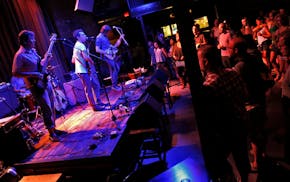In an event wrapped in music, St. Paul Mayor Chris Coleman's State of the City address Thursday night was a song of praise for the progress made in his near-decade as mayor and a hymn of determination for goals yet unmet.
The state of the city, Coleman said, is strong but could be stronger. Crime is down, graduation rates are up, new businesses are cutting ribbons and the Minnesota Wild hockey team is in the playoffs — a line the mayor repeated to comic effect throughout the speech.
Cautioning that not everyone yet shares in the city's success, however, Coleman pledged to continue efforts to bridge nagging socio-economic and educational gaps among the city's diverse groups and neighborhoods.
"We must aim not to narrow the achievement gap, but to close it. Aim not to reduce disparities in income and employment and in housing and in health care, but to eliminate them. Aim to create a 21st Century community not just at the Ford site, but in every corner of this city," he said.
He offered one new program to help get there: "Commercial Vitality Zones" to boost job opportunities and development in neglected commercial corners of the city.
The mayor said that the first two grants to create the zones, totaling $700,000, will be made next month. The funding will be drawn from the city's $42 million 8-80 Vitality Fund, and Coleman said that additional underperforming areas will be identified by city planning and economic development staffers for future grants.
His biggest news was that Ecolab will buy Travelers' north tower in downtown, where the Fortune 500 company plans to consolidate its downtown employees. The deal had been rumored for months, and the mayor thanked both companies for their ongoing "commitment to St. Paul."
Overall, the tone of his 10th annual State of the City address was buoyant — so much so, in fact, that Coleman brashly said he foresaw a parade on 7th Street to celebrate a Wild championship and the Stanley Cup coming to St. Paul. To his credit, he didn't say exactly when.
Coleman spoke for 26 minutes at the Ordway Center's new $42 million concert hall, which opened in February after two years of construction. It was built with $20 million in state funding and $3 million from the city, with the balance coming from donors.
Musicians with the St. Paul Chamber Orchestra, the concert hall's anchor tenant, played Bach's Third Brandenburg Concerto before the speech. Immediately afterward, the hip-hop group Heiruspecs kicked off a set of music by several artists ranging from jazz to rap. Coleman quipped that his speech was "the worst intermission ever."
The mayor acknowledged that St. Paul has a ways to go to match the musical reputations of cities such as Austin, Texas, and Nashville, but the setting of the speech underscored the importance he places on making St. Paul "a great music city." He declared that 2016 will be the Year of Music in St. Paul, and set forth the goal of having every child in the city experience live music next year.
Why? "Because culture and music and vitality are inextricably linked," said Coleman.
Coleman, who has made education a focus of his time in office, said that two of his initiatives already are helping to close the gap between white and minority students: the Sprockets program, which offers educational activities after school, and the Promise neighborhood, a city and schools collaboration to aid young students in the Frogtown and Summit-University districts.
He did not mention St. Paul schools Superintendent Valeria Silva, who has worked closely with Coleman for several years but surprised people recently by briefly entering her name for the top schools position in Palm Beach County, Fla.
Coleman cited with approval the opening of the light-rail Green Line, which follows University Avenue and goes downtown, and the spanking-new CHS Field, a $65 million downtown ballpark built by the city for the St. Paul Saints and amateur sports teams.
He said the city issued $715 million worth of building permits last year, nearly double the number issued in 2009.
And as further proof that city programs are bearing fruit, Coleman pointed to Donnell Gibson — a 29-year-old East Side resident who attended St. Paul's EMS (emergency medical services) Academy, which trains low-income residents and people of color to become paramedics.
Two weeks ago, Gibson called on his training in rescuing 10 members of a family from their burning house while on his way to work.
"You may remember that I highlighted one remarkable young man a few years back, Donnell Gibson," Coleman said. "Well, we were right about Donnell."
Kevin Duchschere • 651-925-5035
What we know about the Sen. Nicole Mitchell burglary allegations so far
Man shot by deputy in Montrose allegedly said during earlier clash he'd rather die than be arrested

Icehouse owner hopes to avoid eviction as music scene rallies around Eat Street venue
Edina man admits to fatally shooting a man in Minneapolis during dispute over money

![The Traveler's Building in downtown St. Paul. ] (KYNDELL HARKNESS/STAR TRIBUNE) kyndell.harkness@startribune.com The Traveler's Building in St. Paul,](https://arc.stimg.co/startribunemedia/XX3N7XGYOS3UEUJCZCRBIWDGRY.jpg?w=600&h=600&auto=format%2Ccompress&cs=tinysrgb)